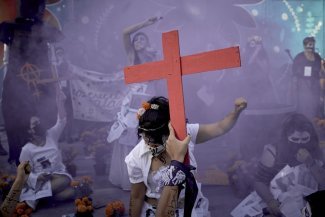
Legend has it that when the English weren’t hacking lumps out of each other in the internecine War of the Roses in the 15th century, opposing warriors would test their manhood and combat skills by kicking around an inflated pig’s bladder. They called the no-holds-barred contest “footie” and thus, it is claimed, the world’s most popular sport was born.
Given England’s pivotal role in first establishing football, codifying it in 1863 with the formation of a Football Association (FA) and then exporting it around the world, it seems apt that England’s Premiership sits atop the action as the biggest league on the planet.
But “this sport for gentlemen, played by workers,” as the game was once described, has never been far from controversy. And today it seems that on any given Saturday – when league matches are traditionally played in England – scandal, incident and outrage steal the headlines over any sporting excellence displayed on the fields of play: biting an opponent, cynical professional fouls, homophobia, lack of equal opportunity and, perhaps most insidious of all, naked racism both on the pitch and in the stands.
It’s a catalogue of shame that the English Professional Footballers’ Association (PFA), the world’s oldest and largest sporting union, which represents the 4,500 current players and 35,000 former players of the country’s 92 clubs, is determined to stamp out.
“Football is a microcosm of society. Whatever happens off the field will inevitably be reflected on it,” Simone Pound, the PFA’s Head of Equalities, told Equal Times in an interview at the union’s London office.
“But it’s also important to see how far we’ve come. I don’t want to be jingoistic about it but I really believe that the PFA and the English game are leading the fight against racism in world football. We’ve come a really long way from where we used to be.
“In the 1970s we used to have banana skins thrown on pitches. Between 1979 and 1984 the (far right) National Front were using football grounds to recruit members. My dad (a West Ham United supporter) wouldn’t take me to matches because of the racist chanting,” said Pound, who is also a Trustee of the anti-racist Kick It Out campaign that was launched by the PFA and the Commission for Racial Equality in 1994.
Pound was speaking in the wake of several recent high-profile racist incidents in football. In September 2012, Chelsea captain John Terry was found guilty by the FA, the ruling body of English football, of racially abusing Queens Park Rangers defender Anton Ferdinand. And Liverpool and Uruguay striker Luis Suarez made international headlines when, in October 2011, he launched repeated racial insults at Manchester United defender and French international Patrice Evra. Terry, 32, an ex-England captain, who seems mired in permanent controversy, was banned for four matches and fined 220,000 pounds (approximately 258,500 euros).
Suarez, 25, who once again has hit the headlines for all the wrong reasons, this time for biting an opposing defender earlier this month, was banned for eight matches and fined 40,000 pounds (approximately 47,000 euros) by the FA, English football’s ruling body.
“Totally unacceptable”
Piara Powar, Executive Director of Football Against Racism in Europe (FARE), hailed the Suarez sanction as “a landmark decision.”
“This is the first time we have seen an insight into what is said between players on the pitch, and what may have been commonplace between players in the past. This is a big moment and I would say the FA have dealt with this in the right way,” said Powar.
“These incidents were awful for everyone involved in football,” conceded Pound. “And we, as an industry, have to learn from them. We have to reinforce the simple message that racism both on and off the pitch is totally unacceptable.
“As the union within the industry, we can’t have anything just dismissed as ‘sporting banter’ or ‘industrial’ language. Any racism between players has to be considered as gross misconduct.”
The PFA is now planning to expand its Equalities Department and this season it has launched a pilot diversity-awareness programme at Tranmere Rovers, a League One (third tier) football club in Birkenhead, north-west England.
The programme, conducted by former professional footballers and focusing on the impact of language, the laws of the land, laws of the game, diversity training, cultural awareness and bullying, will be rolled out across all professional leagues at the start of the new 2013-2014 football season.
There have, of course, been massive changes in general and sporting society since the formation of the PFA on 2 December, 1907 in Manchester, home of legendary Manchester United and “noisy neighbours” Manchester City. Racism in English football can be traced back even further.
Long history
In 1885 Arthur Wharton became the first black footballer to play for a recognised club, joining first Darlington FC and later Preston North End.
But even though Wharton was the All-England national sprint champion, he was placed in goal because he was deemed “to lack sufficient character and consistency” to play outside the box.
The first black footballer to play for England was Viv Anderson, then 22, who debuted in a 1-0 victory over former Czechoslovakia at Wembley Stadium in November 1978. Defender Anderson had a distinguished career with Nottingham Forest, Arsenal and Manchester United.
Fifteen years later, another Manchester United footballer, midfield enforcer Paul Ince, who also played for Liverpool and Italy’s Internazionale, became the first black player to captain England.
Today it would be a very poor England team indeed that did not feature a major contingent of black and mixed race players – notwithstanding the country’s singular lack of success in all major football competitions since its solitary World Cup win in 1966.
Nevertheless, despite these advances racism remains prevalent, in the English game, as the high profile cases of Terry and Suarez attest. And, although England has a sizeable South Asian ethnic minority, not a single footballer of Indian or Pakistani origin is playing in the Premiership.
With around a third of all players in the top flight being either black or mixed race, racism is a problem that – in the opinion of this reporter – the venerable Football Association is just not doing enough to tackle. In an age of multi-millionaire footballers how effective is a 40,000 pound fine for on field racism?
For Suarez, who has just been banned for 10 games for his biting outrage, it represents around two-days wages.
Homophobia and sexism remain major issues too.
So when will things change?
“Discussions have taken place,” Funke Awoderu, the FA’s Equality Manager, told Equal Times in response to questions about the ruling body imposing tougher sanctions for racism. “I can’t pre-determine those discussions. But I can tell you that discussions are ongoing and front-facing.”
Tiki-taka euphemism and evasion aside, everybody agrees that football has to be “safe” for players and supporters alike. But if the “beautiful game” is to prosper it must also be remembered that beauty lies in the eye of the beholder.








